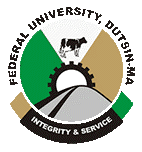Nutrient Digestibility and Growth Performance of Red Sokoto Bucks fed Processed Piliostigma reticulatum Pods
DOI:
https://doi.org/10.33003/frscs_2025_0401/02Keywords:
Digestibility , Growth Performance , Piliostigma reticulatum , Red Sokoto BucksAbstract
The nutrient digestibility and growth performance of Red Sokoto bucks fed diets containing different
processed forms of Piliostigma reticulatum pods were assessed in an experiment. A completely
randomized design was used to assign fifteen bucks at random to three different dietary treatments.
Treatment one served as control as such, did not undergo processing, while in treatment two, the P.
reticulatum pods were soaked in water for twenty-four hours and in treatment three, the pods were
roasted under controlled time and temperature. The experiment lasted for 63 days. The findings
showed that there were no significant (P>0.05) differences in digestibility. However, dry matter
digestibility (DMD), neutral detergent fiber digestibility (NDFD) and crude fiber digestibility (CFD)
were numerically highest in treatments 2 (92.72, 87.13 and 92.24%), and lowest in treatments 3 and 1
(72.00, 85.69 and 89.53%) and (81.76, 75.56 and 81.67%) On the other hand, ash digestibility
(ASHD), acid detergent fiber digestibility (ADFD) and crude protein digestibility (CPD) were higher in
treatment 3 (89.13, 85.92 and 81.62%). These values were lowest in treatments 1 and 2 (83.51 and
82.81%), (76.03 and 83.70%) and (77.70 and 78.41) respectively. The dietary treatments had an impact
on growth performance where live weight gain; treatment 1 had the lowest average daily weight gain
(13.17 g/day) and treatment 3 had the highest (23.25 g/day). The animals that were fed diet 3 (7.19) and
diet 2 (14.12) made better utilization of their feed than the others. Treatment 2 where animals were fed
with water-soaked Piliostigma reticulatum pods was suggested for raising Red Sokoto bucks due to the
higher dry matter digestibility (92.72%), neutral detergent fiber digestibility (87.13%), crude fiber
digestibility (92.24%), total weight gain (0.82kg) and superior feed conversion ratio (16.73) compared
to other treatments






